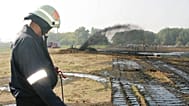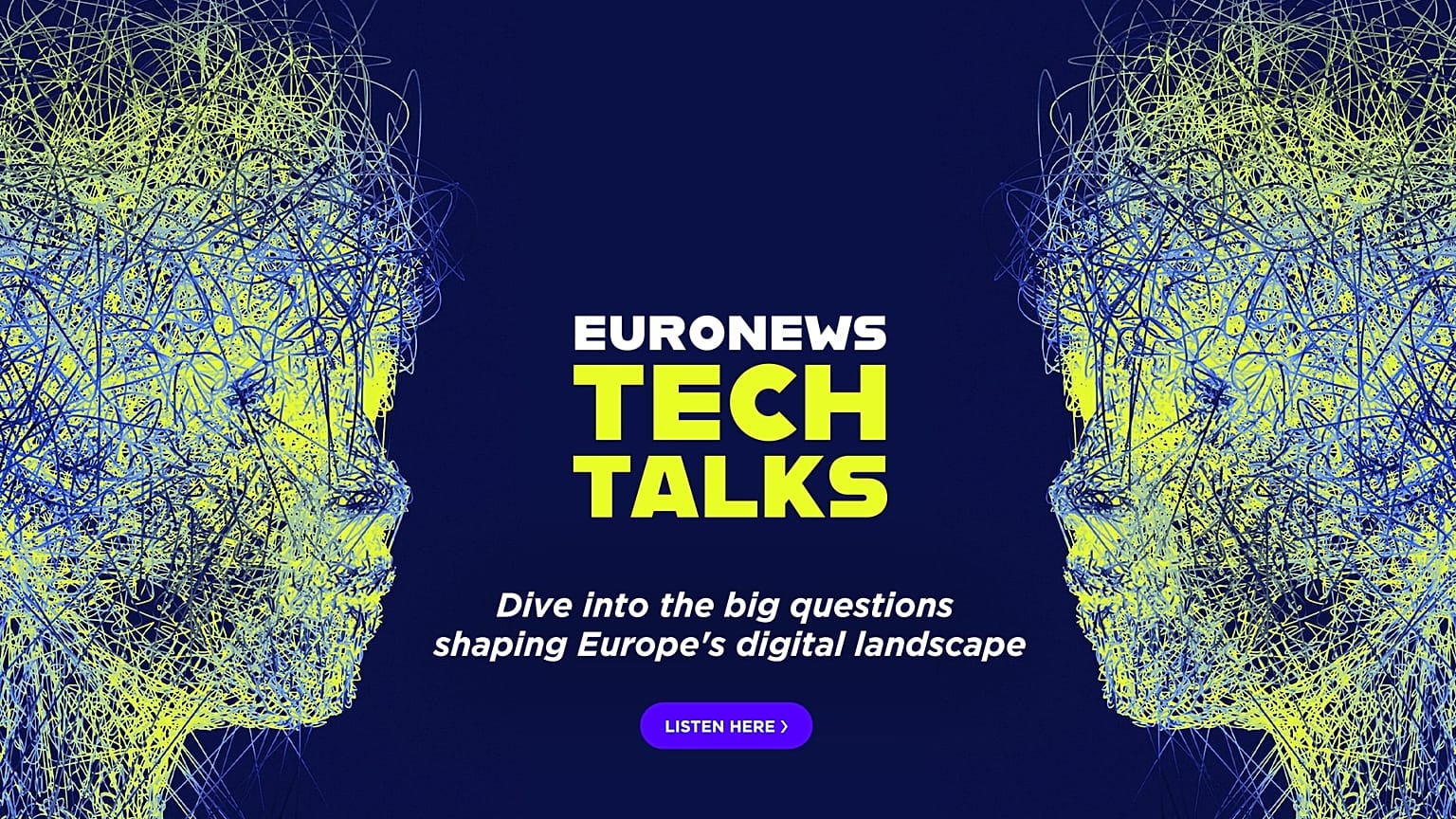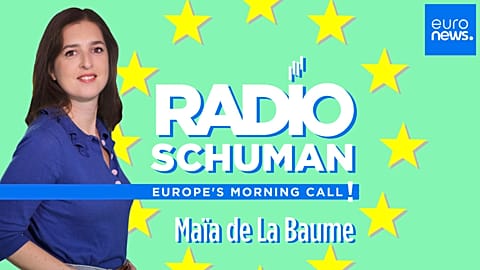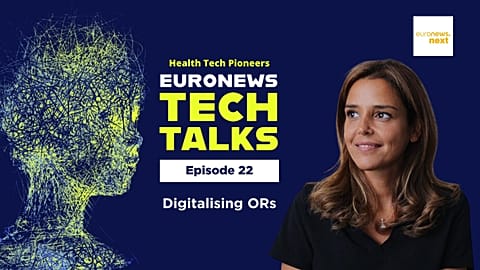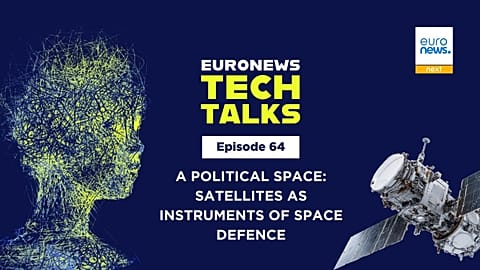Euronews Tech Talks goes beyond discussions to explore the impact of new technologies on our lives.
From AI regulation and digital sovereignty to blockchain and net neutrality, we delve into the big questions shaping Europe's digital future. But we don't stop at talking - we hit the streets.
 ADVERTISEMENT
ADVERTISEMENT
 ADVERTISEMENT
ADVERTISEMENT
Our team explores how these technologies and policies impact Europeans' lives. With clear explanations, Q&As, and lively debates, our English-language podcast is a must-listen for those interested in the impact of technology on European society.
Stay ahead of the curve! New episodes are released every other Wednesday.
Listen to all Euronews Tech Talks episodes
1 - Generative AI: The Creature, the Tool and the Plum cake
In the months since, ChatGPT emerged, Europeans have become newly empowered. In this first episode of Euronews Tech Talks, an Italian programmer delegates code-writing, a French artist reinvents her practice, a Cypriot student brainstorms, and a German teacher ignites minds.
But as the AI revolution unfolds, and the stuff of sci-fi becomes reality, we wonder if we’re in for a happy ending, or something else.
2 - Generative AI: Terminator's Nuclear Winter or Wall-E's Robotic Paradise?
The risk of apocalyptic scenarios and human extinction has been an unavoidable part of the conversation around AI programmes like ChatGPT since their release. But are these concerns being blown out of proportion?
In this episode, we hear from two experts: Dr. Sabine Hauert, a robotics-specialised scientist who envisions a future reminiscent of Wall-E rather than Terminator, and Dr. Matthew Glanville, an education-focused mathematician who is less concerned about students cheating than he is about them underutilising the technology.
3 -Q&A: Will Generative AI surpass human minds?
How is ChatGPT affecting the workforce? Can it tell us where to buy illegal drugs? Will artificial intelligence become smarter than humans?
Our team attended VivaTech, one of Europe's largest tech and start-up fairs in Paris, to gather concerns and questions surrounding generative AI technology. Then we asked experts to respond to those queries.
4 - Blockchain: Crypto Valley
Cryptocurrency has been talked about for years. You might even know someone who has invested in Bitcoin or one of the thousands of other ‘cryptos’ that exist. But has cryptocurrency and its blockchain technology fully landed in Europe?
In this episode, we look at Europe's so-called “Crypto Valley”, discuss trust in decentralised banking systems and see how renewable energy sources are changing Bitcoin mining in Europe.
5 - Blockchain: What are Web 3 and NFTs and do we actually need them?
Blockchain is more than just Bitcoin. It has applications across various domains, including paying taxes and creating art. One of its most ambitious proposals is a censorship-free Internet, where our privacy is not compromised while browsing.
We hear from two tech experts in this episode of Euronews Tech Talks: Maria Paula Fernández believes that Web 3 holds the promise of a superior Internet and Dr Alex Preda discusses whether it is already a reality or still in the realm of utopia.
6 - Q&A: Will blockchain ever become mainstream?
If all their processes are so secret and protected, how can we ensure blockchain is not used illegally? What is blockchain competing against? What is the purpose of Web 3? And how much do blockchain technologies pollute?
Our team attended one of the biggest theatre festivals in Europe, the Festival d'Avignon, and answered these questions while exploring blockchain through theatre. Please take your seat and enjoy this far-fetched comparison.
7 - Space Exploration: Very down to Earth
It's been more than 50 years since humans first stepped onto the Moon—a landmark moment that remains unmatched. But even though we’re not all taking weekend trips to the lunar surface, don't think for a second that space exploration has slowed down. In fact, it's picked up steam.
In this episode, we're journeying through Spain, France, Germany, and the UK to uncover how the work being done up there is making our lives better down here.
8 - To the Moon and beyond, with astronaut Samantha Cristoforetti and scientist Angelique van Ombergen
“Whenever we expand our capabilities, we want to go places.”
While in conversation with ESA astronaut Samantha Cristoforetti and Lead for Life Sciences, Angelique Van Ombergen, India made history by becoming the first country to land near the lunar south pole.
With that space exploration milestone in the backdrop, we envisioned a near future with the Lunar Gateway already operational, serving as the first international station on the moon, as we delved into a captivating topic: Can humans feasibly hibernate for long-duration space travel?
9 - Q&A: Life exists outside of Earth with astronaut Matthias Maurer
Will humans ever be born on the Moon? Until then, ESA astronaut Matthias Maurer answers questions about life on the International Space Station, humanity's last frontier. From daily routines to his deepest fears, from his diet to his daring first spacewalk. The questions come from France's largest planetarium at Vulcania Theme Park.
10 - Who is actually in the metaverse these days?
Leonida is a 13-year-old, and almost every day, he enters a metaverse. There, his avatar meets the avatars of some of his friends in the real world, and together, they travel from world to world. Does this mean that THE metaverse already exists? And if so, why do we want to be there?
11 - What am I missing out in the metaverse?
If you're not a teenager deeply immersed in Roblox, Minecraft, or Fortnite, you might be wondering what you're missing out on in the metaverse.
We spoke with three experts in the field of virtual reality (VR) education: Matt Sanders from Meta, Christopher Mallet from Bodyswaps, and Alexander Nick from GoStudent. They elaborated on the benefits of acquiring diverse skills in a VR environment, ranging from learning a foreign language to honing job interview preparation.
12 - Q&A: Will we spend more time in the metaverse than in real life?
Do you want to experience Hell or Purgatory? We put on our virtual reality glasses at Italy’s Museum of Cinema in Turin to learn about the metaverse. Will the metaverse soon be able to replicate all the features of the real world? This is one of the key questions we asked experts to learn more about how to access the metaverse and the risks it could bring as it evolves.
13 - Almendralejo: When deepfakes are used to undress teenagers
It was a quiet Sunday when Spanish journalist Marian Rosado was browsing her Instagram account and suddenly stumbled upon an unusual Instagram live broadcast.
The well-known gynecologist Miriam Al Adib was revealing a very personal and shocking situation: her 14-year-old daughter just told her somebody used an app to take her photo from social media and made it look like she was naked.
This is just the beginning of a scandal that placed a quiet town in southern Spain in the spotlight.
14 - Seeing is no longer believing
Identity theft, non-consensual porn content, scams, misinformation...Is it possible to use AI deepfake technology for something other than causing harm?
We speak with John Egan, the CEO of L'Atelier BNP Paribas, in an attempt to find some answers: “It's like talking about knives. If we're only discussing knife crime, we're not going to talk about how knives are used in the kitchen for cooking, right?"
15 - Q&A: Fake news isn't new, deepfake news is
How can we protect ourselves from being deepfaked? Can a single photo published on social media ruin our lives? Is there a way to regulate it, or are we living in the Wild West? We posed these questions to experts in debunking fake news and privacy protection in AI.
16 - Are hackers criminal masterminds?
Is hacking illegal? How can it be harmful? And can it be beneficial for society?
Prepare for an exploration of human dilemmas in the digital realm through three notorious hacking cases in video game history.
17 - The Hydrogen Rush
It can be white, green, blue, pink or grey. It can be produced by natural gases, renewable energies, coal, nuclear power, and carbon capture. It stores and transports electricity. What is it? Hydrogen!
Since the beginning of the war in Ukraine and the European search for alternative energy sources, this chemical element has gained lots of attention. Some politicians and researchers even dare to describe it as the future fuel of Europe.
18 - Of Hydrogen-Powered Trucks, Flying Taxis and Cheese
The concept of trapping pure hydrogen in cells isn't just something out of a sci-fi movie anymore. Engineers are working hard on creating fuel cells for transportation that act like batteries, suitable for all sorts of vehicles like trucks.
In this episode, we chat with Michael Perschke, CEO of Quantron AG, about hydrogen-powered trucks and how he uses cheese metaphors to explain how they work.
19 - Q&A: Is it possible to heat my house with hydrogen?
The best-kept secret of Meucci, the Italian high school, is its green boiler. It's tucked away amidst the tall trees in its garden and a fenced concrete structure, but it has piqued the curiosity of its students about this promising new energy source.
To answer their questions, we talk to Rosalinde van der Vlies, the Director of Clean Planet in DG Research and Innovation at the European Commission.
20 - The Europeans behind the world's first AI regulation
13 March 2024, Strasbourg: The President of the European Parliament, Roberta Metsola, is about to announce the approval of the AI Act, the first Artificial Intelligence regulation in the world.
In this episode, we meet the authors: Brando Benifei and Dragos Tudorache. Together, they made history in the world of AI. Regulators worldwide will look to their text for inspiration.
21 - Should we accept the cookies?
Think about what you did yesterday with your phone. Did you look for an address? Did you order food? Did you read a newspaper? Did you listen to a podcast? Did you open an app or take a photo? It's all registered. Today, it's almost impossible to live without leaving a digital footprint.
How can we be sure this very long trail of data protects us and does not violate our privacy? In this special episode, we traveled to Vienna, the capital of Austria, to find answers at the Fundamental Rights Forum 2024.
22 - Digitalising ORs with surgeon Nadine Hachach-Haram
Dr. Nadine Hachach-Haram, a London-based plastic surgeon, once noticed that despite the increasing digitalisation, operating rooms lagged in leveraging their potential to democratise access to quality healthcare. This realisation led her to become what she calls an "accidental entrepreneur" and found her company, Proximie, to introduce technology in traditional operating rooms.
23 - Tech for women's well-being with Ida Tin
Ida Tin, the Founder of the menstrual tracker app Clue, and the woman who coined the term for tech tailored towards women’s health and well-being: Femtech. Can you imagine this term didn’t exist before 2016?
24 - Quantum Pharmacy with Jean-Philip Piquemal
Quantum is the smallest possible amount of something in the universe, but it could spark the most significant revolution in medicine of the century. How? By accelerating the discovery of new drugs through quantum computing.
25 - Birthing Europe’s new rocket Ariane 6
Europe's space sector is popping some long-awaited champagne: it has a new baby that is ready to take its first steps. What's Ariane 6 like? What's new about it? What space adventures await?
26 - Green or red button for Ariane 6’s launch?
Raymond, Aline, Anne-Sophie, and Romain are four of the many Europeans involved in the building and launch of Ariane 6, Europe’s brand-new rocket.
27 - A day with advanced quantum computing
When Emma Müller, a 44-year-old German woman, wakes up each morning, she already has a detailed plan for her health status, dietary suggestions, and exercise recommendations to optimise her day. She works only three days a week thanks to her high productivity levels.
28- Q&A Is Schrödinger’s cat dead?
What is quantum computing? Will it simplify our lives and increase our productivity? What challenges does it face and will it replace parts of our laptops and smartphones for quicker computations? Plus the century's mystery: Is Schrödinger’s cat dead or alive?
29- Concordia
Imagine living for months without seeing daylight in a place where temperatures range from -80 to -20 degrees Celsius, and spending an entire year with only a small group of colleagues. Located in the heart of Antarctica, Concordia Station hosts scientists from the European Space Agency (ESA) who are interested in researching how humans can adapt to extreme environments.
30- The body in space
John McFall is the subject matter expert for a European Space Agency study aimed at fully integrating an astronaut with a physical disability into a long-duration mission to the International Space Station. He is also the first world's astronaut candidate with a physical disability.
31- Anti-ageing tips from astronauts
Travelling to space has been found to alter different parts of the human body, so what's the most effective strategy for combatting accelerated ageing in space? Astronauts offer a model for studying this and can provide insights into how these processes work and how to counter them.
32- Inside Europe’s first IBM quantum data centre
IBM has opened its first European quantum data centre in Ehningen, in the south of Germany. What is it? And how will it impact the lives of European citizens? Euronews Tech Talks travelled to Germany to discover it.
33- The Atomium: Fears and hopes, then and now
In this Q&A episode, we take you on a time travel to explore the origins of nuclear energy and address your questions about it with Diane Cameron from the Nuclear Energy Agency.
34- Nuclear energy: The debate
Should green advocates support or oppose nuclear energy? The answer to this question and many more on the Euronews Tech Talks nuclear energy debate with Michele Governatori and Myrto Tripathi.
35- Nuclear fusion: The JET project
What makes fusion energy so challenging, and why is there so much hype around it? Euronews Tech Talks explored these questions through the JET project.
36- Q&A: Lithium, the key to a sustainable future?
Lithium, often referred to as “white gold,” is among the most sought after raw materials in the world. This metal plays a central role in our daily lives, as it is used in the rechargeable batteries that power our smartphones, PCs, electric vehicles, and e-readers. But what is so special about lithium and what environmental cost does it have?
37- How would we live without lithium?
At first glance, lithium might look like a simple metal characterised by a funny soft texture. However, its use in lithium-ion batteries has made it a game-changer in our modern world.
In this episode of Euronews Tech Talks, we talk to Maitane Berecibar, head of the battery and innovation centre at the Vrije Universiteit in Brussels; Julia Poliscanova, senior director at Transport and Environment in Brussels; and Aurore Carré, head of the energy storage section at the European Space Agency (ESA) to understand the revolutionising impact of lithium on how we travel around the world and in space.
38- Does Europe need lithium mines?
Europe is believed to possess significant yet unexploited lithium resources in Germany, Czechia, Serbia, Spain, Portugal and Austria. However, mining projects in these countries have faced strong opposition from citizens and environmental groups.
Euronews delves into the debate with insights from two experts with contrasting views on the issue: Lindsey Wuisan, resource justice and new economies' campaigner at the NGO Friends of the Earth Europe and Peter Tom Jones, director of KU Leuven Institute for Sustainable Metals and Minerals.
39- Reconditioning and recycling lithium-ion batteries
In 2022, an estimated 62 billion tonnes of electronic waste were produced globally. Of this, only 22.3 per cent was documented as formally collected and recycled.
This includes lithium-ion batteries and to explore their lifecycle, Euronews Tech Talks spoke with Alban Regnier, president and co-founder of the French company Volt R and Alberto Tosoni, CEO of the Italian company Ecomet Refining.
40- The Moon, Mars, and beyond with ESA astronaut Luca Parmitano
The Artemis program, Mars exploration, and the future of the International Space Station mark an exciting era for space. ESA astronaut Luca Parmitano joins Euronews Tech Talks to discuss these projects and Europe's role in them.
Former commander of the International Space Station, Parmitano is now based in Houston, in the United States. There he works as the liaison officer between the European Astronaut Centre and the Johnson Space Centre, he answers the call: “Houston, we have a problem!” and he trains other astronauts for spacewalks.
41- Does space need a clean-up? A conversation with ESA expert Quentin Verspieren
In Gravity, the 2013 film directed by Alfonso Cuarón, astronauts Matt Kowalski and Ryan Stone are on a spacewalk when they are struck by an expanding cloud of debris, tearing Stone away from the spacecraft.
While the film’s plot is fiction, it is based on a real theory proposed by NASA expert Don Kessler in 1978. His theory is that once space debris reaches a critical mass, collisions will trigger a chain reaction generating even more debris.
Whether Kessler syndrome is already a reality remains a topic of debate in the scientific community. What is certain is that the recent boom in space exploration is raising many questions about how to manage space junk.
To better understand space debris and its risks, Euronews Tech Talks spoke with Quentin Verspieren, the space safety programme coordinator at the European Space Agency (ESA).
42- Can observing Earth from space help tackle climate change? A conversation with ESA expert Jean-Christophe Gros
The Soviet Union launched Sputnik I, the world’s first artificial satellite, in 1957, forever changing history.
Nearly seven decades later, satellites have become an integral part of our daily lives, powering global positioning systems (GPS), providing weather forecasting, and monitoring climate change.
But how does Earth observation really work? And what challenges can it help us solve? To answer these questions, Euronews Tech Talks spoke with Jean-Christophe Gros, the EU programme coordinator at the European Space Agency (ESA).
43- Q&A: Uncovering GMOs
To better understand what GMOs are and how they work, Euronews Tech Talks collected questions from its audience and asked them to Josep Casacuberta, a researcher at the Centre for Research in Agricultural Genomics in Barcelona and the chair of the genetically modified organism (GMO) panel of the European Food Safety Authority (EFSA).
44- NGTs: Why all the buzz?
In today’s episode, we’ll dive into the world of new genomic techniques and their application in the agricultural sector.
Once again, our journey will take us to the UK, more precisely in Hertfordshire, a county in southeast England. Here, a group of scientists is running Europe’s first gene-edited wheat field trial created through CRISPR-Cas.
We’ll quickly realise that just like their ancestors, NGTs are a highly divisive topic.
45- Should the EU relax regulations on next-generation GMOs?
Few topics are as divisive and controversial as genetically modified organisms (GMOs). The same level of contention also characterises new genomic techniques (NGTS), often referred to as the new generation of GMOs.
To better understand the reasons for and against the deregulation of NGTs, Euronews Tech Talks spoke with two experts from different sides of the debate: Michael Antoniou, Professor of molecular genetics and toxicology at King’s College London; and Nathalie Verbruggen, Professor of plant physiology and molecular genetics at the Université Libre de Bruxelles.
46- Uncovering forests' mysteries from space
Blasting off from Europe's spaceport in Kourou on April 29, the European Space Agency (ESA) launched Biomass into orbit, a satellite designed to measure the amount of carbon tropical forests store. Euronews Tech Talks was on site for the liftoff. In the first of two special episodes dedicated to the satellite, the podcast looks back at the eve of the launch to explore the satellite, the people working on it, and how they felt ahead of the crucial launch day.
47-ESA's Biomass satellite: The D-Day
What happens on a satellite’s launch day? What are the thoughts and emotions of those behind the mission?
In this second of two special episodes on the European Space Agency’s Biomass satellite, Euronews Tech Talks takes you to Kourou for a behind-the-scenes look at the launch to answer these questions.
48- From crisis to cure: Cleaning the world's oceans
Plastic and chemical pollution in marine environments pose a major threat to the health of our oceans. Euronews Tech Talks interviews two experts to understand the scale of the problem and explore the technological solutions that could help address it.
Simon Bernard, CEO of Plastic Odyssey, is on a world tour to collect solutions to plastic pollution; Anneliese Hodge is a researcher working on the impact sunscreen has on the marine environment.
49- What is doping, and how do athletes get away with it?
What is doping? How do these prohibited substances work?
In this Q&A episode, Euronews Tech Talks explores this topic with Andrea Petróczi, Professor of Public Health at Kingston University.
50- Can AI help detect doping in sports?
Researchers are developing AI programmes to make doping detection more effective, faster, and cheaper. How do these systems work? What challenges do their creators face?
Euronews Tech Talks sits down with Wolfgang Maass, Professor of Business Informatics and Computer Science at Saarland University and Francesco Botrè, Director of the WADA-accredited anti-doping laboratory in Rome, to answer these questions.
51- Why do athletes dope, and at what cost? Ex-pro cyclist Bo Hamburger explains
Former professional cyclist Bo Hamburger reflects on his use of a performance-enhancing drug in the 1990s and early 2000s, offering insight into how doping works, why athletes turn to it, and its potential health effects.
52-Q&A: PFAS, what’s all the fuss?
Per- and polyfluoroalkyl substances (PFAS) are man-made chemicals widely used in the industry, but potentially harmful to human health. Euronews Tech Talks explores this topic with chemist and research scientist Martin Scheringer.
53- Life in Zwijndrecht: A European PFAS hotspot
What is it like to live in one of Europe’s hotspots for PFAS contamination? Jeroen Van Reeth, a resident of Zwijndrecht—the Belgian town affected by PFAS produced by the chemical company 3M—opens his home to Euronews Tech Talks to share his experience.
We, then, speak with experts Jacob de Boer, Hans Peter Arp and Madeleine Bussemaker to uncover if and how it is possible to contain and destroy “forever chemicals”.
54- A world without PFAS
Euronews Tech Talks speaks with Fajer Mushtaq, an entrepreneur working to contain and destroy PFAS in wastewater, and with Miika Nikinmaa and Diana Lau, who are developing alternatives to PFAS in food packaging and textiles.
55- Could NASA put a nuclear reactor on the Moon by 2030?
NASA’s decision to speed up plans for building a nuclear reactor on the Moon has raised questions about the United States’ broader space strategy and renewed curiosity about the use of nuclear energy beyond Earth.
In this episode of Euronews Tech Talks, we address these questions with professor Simon Middleburgh, co-director of the Nuclear Futures Institute at the University of Bangor (UK), Alfredo Carpineti, astrophysicist and senior science writer at IFL Science, and Francesco Lodi, researcher at ENEA (Italy).
56- Space-based solar energy: Reality or science fiction?
Although engineers began developing space-based solar energy technology in the 1960s, it still hasn’t become a reality. Why?
In this episode, Euronews Tech Talks tries to answer this question by speaking with Sanjay Vijendran, co-founder and CTO of TerraSpark; Francesco Contino, professor at the school of engineering at UC Louvain; and Wei He, senior lecturer in engineering at King’s College London.
57- To mine or not to mine in space?
We hear more and more about space mining projects—companies are interested in mining asteroids, and the European Commission is exploring the idea of mining the Moon for critical raw materials. But what would be mined? How? And would it be ethical and legal?
In this episode, Euronews Tech Talks sits down with several experts to discuss these questions: Ian Crawford, a professor of planetary science at the University of London; Jill Stuart, an academic at the London School of Economics; Pierfrancesco Biasetti, a researcher at the Summer School in Space Ethics at the University of Padua; Erik Persson, a philosophy professor at Lund University; and Kathryn Halder, director of the European Space Resources Innovation Centre (ESRIC).
58- Will robots do our dishes in 2030?
How is AI transforming robotics? Will robots ever replace doctors or come into our homes? In this episode of Euronews Tech Talks, we put these and more of your questions to Kai Olav Ellefsen, associate professor at the University of Oslo.
59- Can robots grow food on Earth and in space?
Robotics is making its way into agriculture, helping address challenges such as chemical use and labour shortages. What are the potentials? What are the challenges?
In this episode, we travel to Oslo to meet Lars Grimstad, CTO and co-founder of the agri-tech company Saga Robotics. We also hear from professors Stefano Stramigioli and Ioannis Athanasiadis, as well as engineers Giorgio Boscheri and Cesare Lobascio, about how robots are transforming agriculture, both on Earth and in space.
60- A robot to counter children's loneliness
Euronews Tech Talks sits down with Karen Dolva, co-founder and former CEO of the Norwegian tech company No Isolation, whose robots help children with medical conditions and social difficulties attend school.
61- Can we reduce AI's environmental cost?
Artificial intelligence might seem invisible, yet it has a significant environmental impact — one that is difficult to quantify due to companies' lack of transparency with their data. So, to what extent should we be worried? Is there a way to reduce the environmental cost of AI?
To answer this question and unpack the relationship between AI and the environment, Euronews Tech Talks sits down with Jonathan Niesel, leader of the information technology department at Greenpeace Germany and Maja Kirkeby, researcher in the energy consumption of software at Roskilde University in Denmark.
62- Art in the age of AI: Is creativity still human?
If you have been tempted to transform one of your photos into a Studio Ghibli–style illustration with ChatGPT, you should sit down and listen to this podcast.
In this second special episode of Euronews Tech Talks on artificial intelligence (AI), we sit down with artist Sofia Crespo, comic book artist Francesco Archidiacono, and Eleonora Lima, lecturer and researcher in digital humanities at King’s College London, to investigate the relationship between AI and art.
63- Is it safe to use AI chatbots as a therapist?
Little is still known about the relationship between humans, therapy, and AI chatbots, yet these tools are being used by some people seeking quick psychological support. What are the risks, and are there any benefits?
Euronews Tech Talks spoke with Charlotte Blease, a philosopher and healthcare researcher, and Tom Van Daele, clinical psychologist and research coordinator in psychology and technology at Thomas More University of Applied Sciences in Mechelen, Belgium.
64- A political space: Satellites as instruments of space defence
As space becomes increasingly militarised, what role do satellites play, and where does the EU position itself?
Euronews Tech Talks talks to researcher Luciano Anselmo, Geosat CEO Francisco Vilhena da Cunha, and EUSPA executive director Rodrigo da Costa to answer these and more questions.



